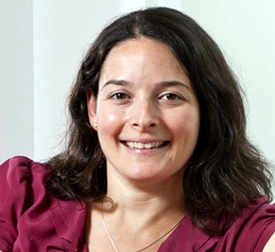Researchers at University of Michigan, Harvard University, and Brigham and Women’s Hospital in Boston found larger numbers of U.S. hospitals and doctors taking part in electronic health records exchanges — services that store patient records for access as needed by different health care providers — but their funding after this year remains in doubt. The findings of the team led by Julia Adler-Milstein, a professor in Michigan’s School of Information, were published online yesterday in the journal Health Affairs.
Health information exchanges make possible the transfer of electronic patient data when the patient is admitted to a hospital or changes health care providers. Gaining access to a patient’s medical histories can help new providers improve their diagnoses, reduce duplicative tests, and improve the quality of care.
The U.S. government made this electronic records exchange capability a high priority, and authorized its implementation through the Health Information Technology for Economic and Clinical Health or HITECH Act, enacted as part of the American Recovery and Reinvestment Act of 2009. Some $600 million was provided to the states for the infrastructure to support their implementation.
Adler-Milstein and colleagues surveyed with online and telephone questionnaires organizations offering health data transfer services, and from a list of 221 prospects that met the researchers’ criteria, got responses from 172 groups. Of that 172 respondents, 119 were considered in operation; the remainder were still in the planning stage. The survey results were then compared to similar studies, the most recent in 2010.
The 119 mainly not-for-profit organizations in the sample represented a 59 percent increase from the 2010 survey, which had 75 organizations taking part, and that gain was indicative of the greater use of their services. The survey showed 30 percent of U.S. hospitals and 10 percent of physician practices taking part in these exchanges, double the rate from 2010 for hospitals (14%) and triple the rate for physician practices (3%).
While these exchange services are growing in number and use, say the researchers, most of the organizations remain funded through their initial federal grants, which run out in 2014. About half (52%) of the services said current grants and contracts were their most substantial source of support. Fewer than a quarter of the respondents were able to cover their costs from fees charged to participants.
As a result, say the researchers, about three-quarters (74%) of the services report finding a sustainable business model to be a moderate to serious problem. And the core of the problem, explains Adler-Milstein is the lack of immediate benefit to the doctors and hospitals taking part.
Health care providers are not willing to pay for the levels of records-exchange service they receive, says Adler-Milstein, because “They don’t see enough value, and that’s because much of it doesn’t accrue to them. It goes to patients and to health insurance companies.” She adds, “The central challenge is that the incentives and the business model are not aligned yet for this to really work.”
Adler-Milstein suggests some of the records exchange services should explore offering broader data services to meet the needs of an increased focus on health care quality and documenting the work of accountable care organizations, doctors and hospitals that work together to coordinate care and reduce duplicated services.
“If these accountable care organizations are going to be successful, they need to know what care patients are receiving,” notes Adler-Milstein. “If you want to know how things are going from a quality perspective, that requires data. It’s a broader effort that’s really about aligning incentives for health care, but underneath it all is health information exchange.”
Read more:
- Simplified Medicare Could Save Money, Improve Senior Health
- Mayo CEO: Government Needs to Fund Health Care Innovation
- Grant to Fund Patient-Sourced Health Outcome Measures
- More U.S. Primary Doctors Using Electronic Health Records
- Report: U.S. Health Care Needs to Adopt Learning Culture
* * *


 RSS - Posts
RSS - Posts
[…] Health Records Exchanges Grow, but Sustainability a Question […]